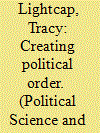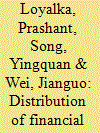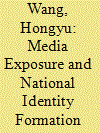|
|
|
Sort Order |
|
|
|
Items / Page
|
|
|
|
|
|
|
| Srl | Item |
| 1 |
ID:
090259


|
|
|
|
|
| Publication |
2009.
|
| Summary/Abstract |
Surveys indicate that there is more interest today in politics among college students than has been the case in the recent past. This article describes a multidisciplinary freshman seminar aimed at using that interest to promote student engagement and the Reacting to the Past simulations at the course's center.
|
|
|
|
|
|
|
|
|
|
|
|
|
|
|
|
| 2 |
ID:
116513


|
|
|
|
|
| Publication |
2012.
|
| Summary/Abstract |
China's central government incrementally introduced various kinds of student financial aid since the late 1990s in response to public concerns about the rising burden of college prices. Despite the marked increase in financial assistance from governmental as well as non-governmental sources in recent years especially, little is known about how well aid is currently distributed across Chinese universities and whether it is successfully reaching needy students.
We use a unique randomly-sampled dataset of all local senior college students in one northwest province and a combination of non-parametric, semi-parametric and fixed effects methods to examine how various types of financial aid are currently distributed to students of different backgrounds across the university system. We also evaluate whether aid is reaching the main target population of low-income students. We primarily find that government-financed aid is allocated evenly across universities of varying selectivity and is reaching its target population of low-income students within universities. By contrast, university- and society-financed aid is not reaching low-income students. In addition, students in the most selective universities receive large implicit subsidies as they have high instructional costs, get more aid, and pay low tuition fees. Finally, a significant proportion of disadvantaged students do not seem to receive any type of aid.
|
|
|
|
|
|
|
|
|
|
|
|
|
|
|
|
| 3 |
ID:
110632


|
|
|
|
|
| Publication |
2011.
|
| Summary/Abstract |
Each election year, colleges and universities across the nation witness a plethora of on-campus voter registration activities. The results of these drives are most often assessed by tallying the number of voter registration cards collected. Little has been done, however, to more carefully investigate these results. As a first attempt to examine postdrive results more thoroughly, we ask two questions. First, do students who register through an on-campus voter registration drive actually make it to the voting booth? Second, does providing basic information about the voting process increase turnout among students who register through an on-campus voter registration drive? In this study, we investigate the overall turnout rate of students registering to vote in the 2008 presidential election through on-campus registration drives by validating votes through the office of the county voting registrar. We then compare the turnout rate of students who registered through the on-campus drives with the turnout rate of similar young people nationwide. Finally, we investigate whether the provision of information through certain avenues boosts turnout. Our findings show that students who registered through an on-campus voter registration drive turned out to vote at a higher rate than similar young people nationwide. Additionally, we found small but important effects of information provision through different formats.
|
|
|
|
|
|
|
|
|
|
|
|
|
|
|
|
| 4 |
ID:
153793


|
|
|
|
|
| Summary/Abstract |
Helicopter parenting is a phenomenon that is attracting sizable attention from university administrators and instructors. We examine the implications of helicopter parenting for both the political science classroom and for public opinion. Using a survey conducted at multiple universities in the United States, we find that helicopter parenting has a significant impact on the policy attitudes of college students. Specifically, students with helicopter parents are more likely to express support for both government surveillance and nanny state policies than are students without helicopter parents. Given the growing trend of helicopter parenting, these findings will likely have substantial implications for both the political science classroom and public opinion in the near future.
|
|
|
|
|
|
|
|
|
|
|
|
|
|
|
|
| 5 |
ID:
160113


|
|
|
|
|
| Summary/Abstract |
Using survey method, this study compares the relative importance of exposure to Chinese media, pro-China local media, pro-democracy local media, and new media (e.g., Weibo, Facebook) on the building of national identity among Macau college students. We argue that the effect of media exposure on national identity formation is not uniform, owing to the political leanings of the media and the platform on which the information is transmitted (new media vs. traditional media). We find that getting news about China on Facebook is the most important predictor of the formation of national identity among college youth in Macau, followed by getting news on Weibo and exposure to traditional Chinese media. Conversely, exposure to pro-democracy local media and frequent use of Facebook exert a negative effect on national identity building among college youth in Macau. Positive sentiment toward China and trust in the central government act as mediators and fully explain the relationship between exposure to traditional pro-China media and national identity but cannot explain the positive effect of exposure to new media on national identity formation.
|
|
|
|
|
|
|
|
|
|
|
|
|
|
|
|
| 6 |
ID:
175297


|
|
|
|
|
| Summary/Abstract |
In considering the liberalizing effect of college on students’ political values, we argue that political identities—in the form of self-identified ideology or partisanship—are components of social identity and are resistant to change. Using data from the Higher Education Research Institute’s student surveys, we show that what movement in identity does occur is mostly a regression to the mean effect. On several issue positions, however, students move in a more uniform leftward direction. We find that liberal drift on issues is most common among students majoring in the arts and humanities. Self-reported ideology does drift left at liberal arts colleges, but this is explained by a peer effect: students at liberal arts colleges drift more to the left because they have more liberal peers. The results have implications for future research on college student political development, suggesting that attitudinal change can be more easily identified by examining shifts in policy preferences rather than changes in political identity.
|
|
|
|
|
|
|
|
|
|
|
|
|
|
|
|
|
|
|
|
|